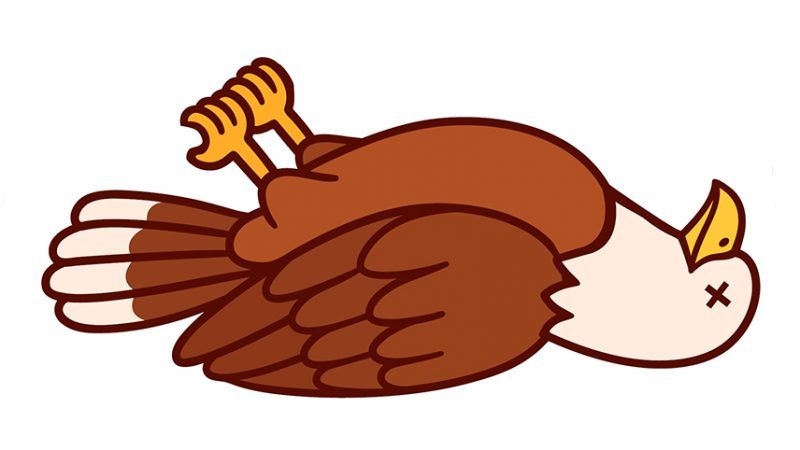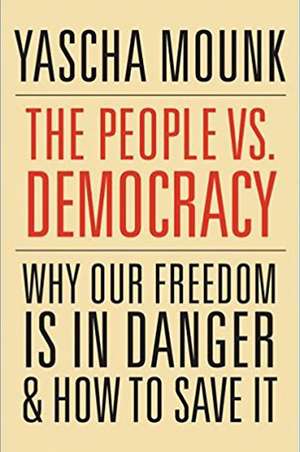The Democracy Theorist in the Age of Trump
Saving liberal democracy one platitude at a time

The People vs. Democracy: Why Our Freedom Is in Danger & How to Save It, by Yascha Mounk, Harvard University Press, 393 pages, $29.95

There is a time in the lives of academics, the fortunate ones at least, when the topic of their research aligns with events taking place on the mean streets beyond the ivory tower. Such has been the lucky lot of democracy theorists in the age of Donald Trump. A small industry of democracy-is-doomed prophets is now proliferating on the nation's bookshelves, from David Runciman's How Democracy Ends (Basic Books) to Steven Levitsky and Daniel Ziblatt's How Democracies Die (Crown). Now joining this morose mix is Yascha Mounk, a lecturer at Harvard's Kennedy School and a senior fellow at the think tank New America, whose apocalyptic stew is titled The People vs. Democracy: Why Our Freedom Is in Danger & How to Save It.
Underscoring the millenarian mood of the moment, Mounk tells us that there are ordinary times and extraordinary times. In the former, "partisans on both sides of the political battle agree on the rules of the game" and on the legitimacy of the electoral process—the political version of allowing the other kids at the playground to have a go at the swings when it's their turn.
But we don't live in ordinary times, Mounk warns. Americans' faith in the fairness and perpetuity of taking turns is fast eroding. Bullies have appeared on the global playground: Trumps, Farages, Orbáns, and Erdogans are elbowing out anyone still putting their stock in rules and fairness. Their arrival shows that the basic contours of "politics and society are being renegotiated." There is name-calling and vilification and a fear that the bullies, once they get on the swings, may never leave. If the erosion of democratic norms that Trump has begotten continues, then the "virus of authoritarianism could ravage the body politic without meeting much resistance."
Despair not, for Mounk intends to tell us "what we can do to rescue what is truly valuable in our imperiled social and political order." A new and recalibrated flavor of liberal democracy is needed, he says—one erected on "inclusive patriotism."
This big idea turns out to be a lot less useful than promised. For all his passionate arguments that we live in an extraordinary time, Mounk fails to offer an extraordinary solution.
Getting to that part of the book requires a lot of wading first. There is, for example, the business of definitions, which come after some chatty opening salvos featuring far-right rallies in Germany. Democracy, Mounk says, is a set of binding electoral institutions that translate popular opinion into public policy. Liberal institutions "effectively protect the rule of law and guarantee individual rights such as the freedom of speech, worship and press to all citizens." Put them together and you get liberal democracy, but liberalism is distinct and can exist in political systems other than democracies, and vice versa. The health of each can make their sum a healthier whole.
Armed with these definitions, we are ready for the book's meaty bits. Except that we never really get them. The center of The People vs. Democracy, chunky as it is around the middle, offers up bland and processed meat; it never delivers the satiation we were promised.
The first part of the book presents in great grinding detail the bad ways to mix democracy and liberalism—when more of one means less of the other, compromising the potential of the whole to deliver stability. In Hungary, for instance, Viktor Orbán's party won power democratically and proceeded to undermine liberal institutions; he has now explicitly vowed that democracy should be more hierarchical than liberal. On the other side, the European Union pretends to be deeply invested in democracy but regularly looks for ways around votes that undermine its agenda of economic liberalization.
Part two enumerates the changing ground conditions that Mounk says have made a rebalancing of liberal democracy urgent and crucial. One is social media, a "world shattering force" that has uncorked huge changes and heralded a communications revolution. Another is economic stagnation in Western democracies, which has shattered the promise of perpetual and ever-increasing prosperity. Finally, a fear of the arrival of foreign "others" has goaded previously tolerant people into nationalist anxiety.
It is a tiring slog through Mounk's elucidations, which are, as readers of the end-of-democracy subgenre will recognize, not particularly novel. All of these ideas have fallen from the mouths of primped television analysts tasked with considering the truths and falsehoods of Trump's latest tweet.
What is repetitious and unoriginal tends to be unproblematic, something we can all hem and haw around at dinner parties. Perhaps worried about boring his readers, Mounk tries to spark excitement with his big solution: "a new language of inclusive patriotism." This too would be tolerable, except his patriotism turns out to be less inclusive than promised.
Mounk's "new language," he tells us, cannot "be blind to persisting injustices…nor can it privilege the nation to such an extent that it either oppresses minorities within the country or goes to war with other countries." Instead, "it must build on the tradition of multi-ethnic democracy to show that the ties that bind go well beyond ethnicity and religion." To make this all happen, "countries must facilitate a sense of community among all citizens and ease fears of future migration."
If you're wondering what actual program all this building and facilitating adds up to, the answer is: not much. Mounk prefers platitudes to action items. And he does not address philosophical liberalism's most vexing problem: the right of nation-states to accord different rights to individuals based on birth or geography.
Liberals differ on whether the individual's right to free movement can be made secondary to the interests of a particular state, but Mounk sidesteps the issue entirely. He does not describe the basis on which rights should be allotted, the conditions on which migrants could be admitted, and what immutable characteristics could lead to exclusion. Instead there is this: "we should acknowledge that it does not violate the principles of liberal democracy for nations to improve their ability to track and control who gets access to their territory," and "it is perfectly conformable with principles of liberal democracy for nation-states to honor popular preferences by lowering the overall number of immigrants."
In other words, while the book calls for "inclusive patriotism," it is scant on details of who exactly should be included. If their number is to be lowered, by how much? Would the illegally admitted be allowed to join their ranks? Is there a substantive distinction between Mounk's concept and simply privileging the native born and adding a smattering of lucky others to the mix? The book offers no answers.
Mounk's rhetoric is much kinder than the race-baiting bluster of the Trump era, but it remains at its heart a justification for exclusion. Rights, opportunities, and belonging will still rest on the random luck of being born to certain parents or geographies. Whether or not that's patriotic, it certainly isn't very inclusive.
This article originally appeared in print under the headline "The Democracy Theorist in the Age of Trump."


Show Comments (306)